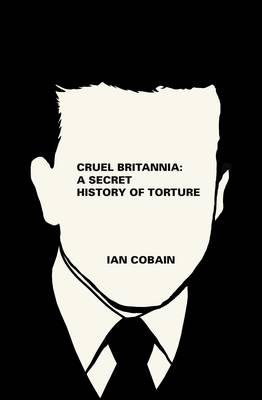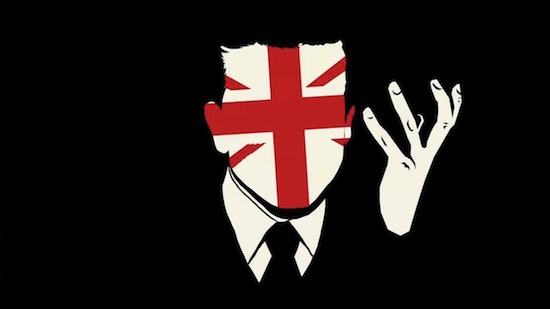Ian Cobain knows most of the West’s darkest and best-kept secrets; from the prisoner of war facility in Kensington that was used during and after WWII, to the fact that George Bush can no longer travel to Europe for fear of being arrested. In his first book Cruel Britannia, the investigative reporter at The Guardian centres on Britain’s deceit in using torture, from wartime through to the Cold War and the Global War on Terror. Here he explains more about his career in secrecy and writing a book that has changed many people’s view of the supposed decency and transparency of the British Government.
When did you start investigating secrecy?
Ian Cobain: It was around 2007. I was covering a terrorism trial and realised that one of the defendants had been tortured in Pakistan before being deported to the UK. Then I heard a similar criminal case, then a third, then a fourth. This pattern meant the British had been closely involved in the torture of their own citizens and I started asking questions to the foreign office. They tried to fob me off in really quite a clumsy way, not answering my questions over the phone and pasting them into an Freedom Of Information request when I put them in writing. Fabricating an FOI request. So at that point I realised they had something to hide, that possibly the British were secretly involved in a series of very serious crimes; and indeed I discovered they were.
Also, a couple of years before that, I came across a reference in a book review to a place called the London Cage. When I tried to find out more about I realised it was very difficult. But what I did find out about the London Cage was that it was this terrible place, a prisoner of war facility accused of several counts of torture, that the British had run right in the middle of London in the Second World War. After that various people suggested I try and join the dots and see what I discover about our use of torture in the Second World War all the way up to the present day.
When you set out on that journey did you encounter any hostility?
IC: Well I had one threat from a police officer and what would usually happen is, the people in authority would talk to my colleagues at the Guardian and suggest that if I continued paper would make a fool of itself. And of course we were absolutely right and in the right to publish my findings. Eventually the body of evidence built up and it became harder and harder for ministers and officials to deny the truth about what had been happening. It came to a point where they were turning around and saying, “Well it’s all terrible, but it didn’t happen on my watch.” Blaming it on predecessors.
Have you ever witnessed torture personally?
No, I never have. I’ve been around prisons in Afghanistan, which were pretty grim places but I’ve never been to Guantanamo Bay. Thankfully.
Have you been following the Hunger Strikes in Guantanamo?
IC: Yes and I think people are trying to make one last push to persuade the Obama administration to shut it, trying to shame that administration into doing so. It’s a concerted effort both by prisoners who are on hunger strike and lawyers who are advocating and litigating this cause.
But the Americans were always over a barrel. As soon as they opened it they were over a barrel. They couldn’t kill them all and they didn’t stop and think, ‘what can we do with these people in the long term?’ They couldn’t hold them indefinitely. You can’t just hold people for decade after decade after decade without prosecuting them because it’s a stain on the reputation of the nation.
What is the present state of the so-called ‘Global War on Terror’?
IC: I think this administration’s has found a different way of dealing with people they want to dispose of. Instead of picking them up and flying them off to different countries around the world where they can be tortured or taken to Guantanamo Bay, they’re just killing them with drones. There have been lots of drone attacks in Pakistan and Afghanistan and smaller numbers of them in Somalia and Yemen.
Do drones pose more problems for accountability and making sure people are brought to justice for their actions in crimes of war?
IC: It’s likely. It’s a very complicated issue. I mean we know for example that George Bush is unlikely to travel to Europe because there’s been pressure from human rights organisations to arrest him. I mean, it might not bother him because he’s probably quite happy to stay in Texas. But maybe Mr. and Mrs. Obama, when he’s no longer in office, would like to travel to Europe, and I’m sure there are people who will say that some of the killing has not been lawful regardless of the legal advice that’s been sought and given by American government lawyers.
One of the most moving aspects of Cruel Britannia was your own personal realisation that Britain had been involved in torture. How did that revelation make you feel?
IC: It made me realise I should have been far more sceptical a long time ago. It made me realise that the old expression, you shouldn’t believe anything until it’s officially denied, is quite a useful maxim for journalists to work by. It’s also made me realise that our rights and liberties are more fragile than I thought they were. The idea that a government could conspire to secretly to commit a series of really serious criminal offences against its own citizens because it was scared is quite startling. It’s been a hell of an eye-opener.
Why did you decide to write this as a book?
IC: As opposed to a series of articles? Just lots of people kept telling me I should be writing a book about it. It’s as simple as that.
It definitely benefits from having that framing narrative.
IC: Well I wanted to bring together lots of strands to show people that there are dots that can be joined between what happened in wartime Britain, The Cold War, the conflict with Ireland and Northern Ireland and the so-called War on Terror. That there really is a connection between events of that time and techniques – not just techniques of abuse, but techniques of concealment. I wanted to write a book that was something of an eye-opener. I wanted to write a book that slightly changed the way people saw their nation.
Can torture ever be necessary?
IC: Well that’s one of the big questions. The short answer is that it has been shown to work. Not just to extract information, but to intimidate people and communities and to force people to change the way in which they conduct themselves. I think you can say there are circumstances in which it’s explicable and understandable, but I don’t think you can commit to saying that it’s justified in any way. I think it always has to be regarded as utterly reprehensible and it needs to be prohibited. And for prohibition to mean anything, there needs to be the occasional prosecution, I would think. The problem we’ve had since 9/11 is that there hasn’t been, because some of the world’s most powerful states have been responsible for it.
Do you think the modern British history that we are taught, via the media and in schools, is accurate?
IC: I think Britain has a wonderful, illustrious history, but there’s an awful lot for which we should be ashamed. To understand what’s going on today, we need to have a full understanding of what went before. That’s why the book is very much a British book for British people. This idea that we are decent and we don’t do torture it’s a myth, and it’s a myth that doesn’t really travel. You don’t have to go very far before people laugh at the idea of the British being entirely decent and upright people. You only have to go to West Belfast, Cyprus, Kenya… People laugh at the idea.
And why did you choose secrecy – which must be the hardest subject in terms of getting hold of information – as the focus of your career?
IC: A number of reasons. One is that is that I enjoy the challenges. I could have chosen something easier but I wouldn’t have found it as satisfying. The other reason I spent so much time on this is that very few other British journalists are interested in it. In the United States a great many journalists are trying to find out more about the crimes that were committed by the United States government after 9/11. In the UK there are very few. I don’t know whether that’s because most UK journalists are taking their cues from authorities, assuming that their readers and listeners are quite content with these sort of abuses. I don’t fully understand it. A few years ago a whole batch of, oh I don’t know, twelve members of the House of Lords – really illustrious figures – wrote a letter to The Times saying there needed to be investigation into Britain’s involvement in torture. They published the letter but didn’t publish a single news story.

Cruel Britannia is available now, published by Portobello Books


